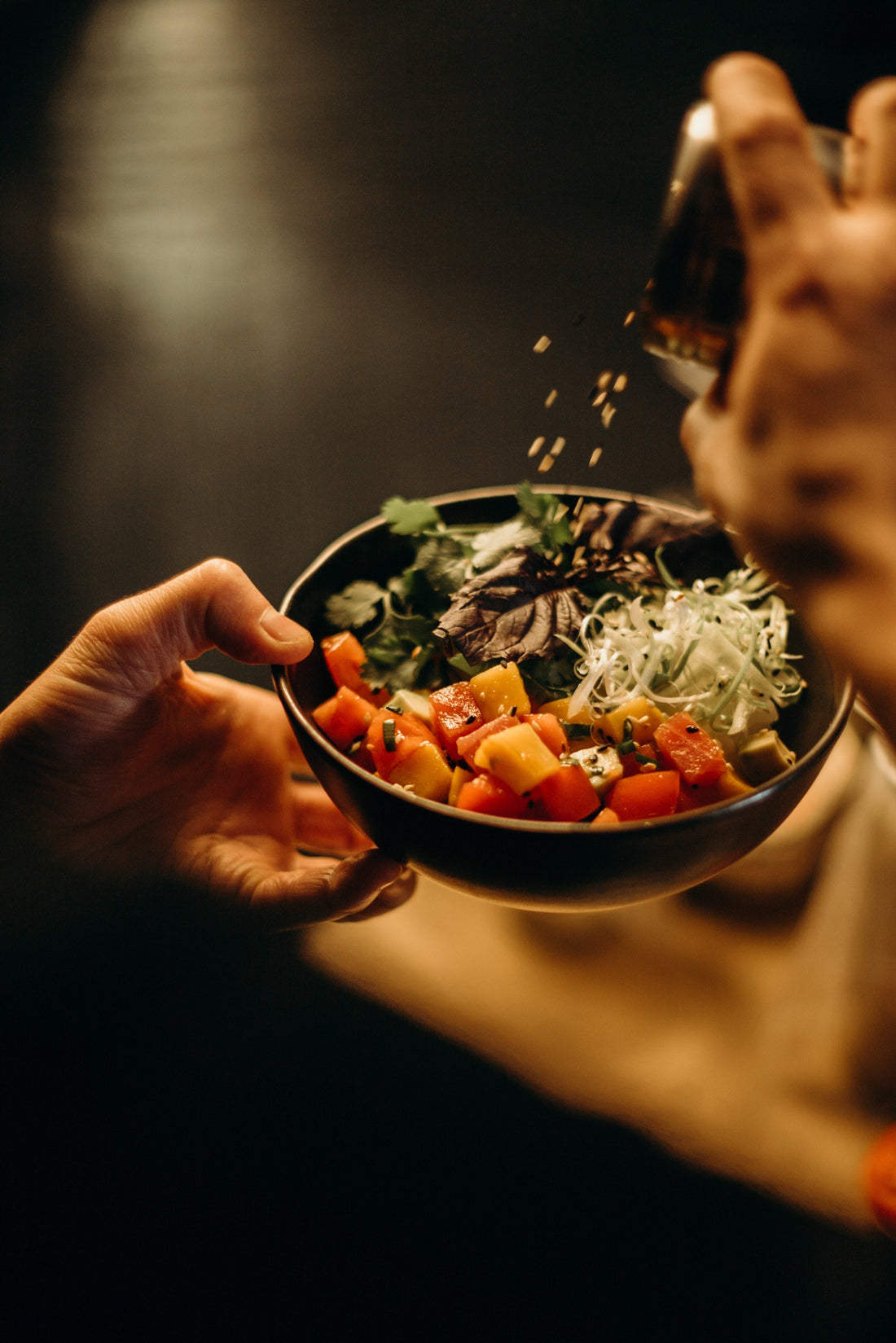
9 Turmeric Salad Dressing Recipes
Share
Reinvigorate Your Love For Salad
Salads are a delicious and healthy way to incorporate fresh vegetables and greens into our daily diets, and with more delicate leafy greens popping up at the local farmers markets, we are finding ourselves making them more and more often. But let's face it, sometimes salads can get boring. That's where a good salad dressing comes in! And if you're looking for a dressing that not only adds flavor but also packs an extra nutritional punch, turmeric powder is the perfect ingredient to add. You might even have it in your cupboard already! If you don’t have turmeric powder at home already, you can buy our organic turmeric root here. Get ready, these recipes are not only delicious but also good for you!
1. Turmeric Maple Mustard Dressing
- 1 tablespoon Dijon mustard
- 1 tablespoon of maple syrup
- 2 tablespoons of apple cider vinegar
- 1/2 teaspoon of turmeric powder
- 1/4 teaspoon of garlic powder
- 1/4 teaspoon of black pepper
- 1/4 teaspoon of paprika
- 1/4 cup of olive oil
Instructions: Whisk together all ingredients and enjoy!
2. Turmeric Avocado Dressing
- 1 ripe avocado
- 1/4 cup of lime juice
- 1/4 cup of water
- 1/2 teaspoon of turmeric powder
- 1/4 teaspoon of garlic powder
- 1/4 teaspoon of ground black pepper
- 1/4 teaspoon of salt
Instructions: In a blender, combine all ingredients and blend until smooth. Enjoy!
3. Turmeric Peanut Dressing
- 1/4 cup of peanut butter
- 1/4 cup of soy sauce
- 1/4 cup of rice vinegar
- 1 tablespoon of honey
- 1/2 teaspoon of turmeric powder
- 1/4 teaspoon of garlic powder
- 1/4 teaspoon of ground black pepper
Instructions: Whisk together all ingredients and enjoy!
4. Simple Turmeric Vinaigrette
- 2 tablespoons of apple cider vinegar
- 1/2 teaspoon of turmeric powder
- 1/4 teaspoon of ground black pepper
- 1/4 cup of extra-virgin olive oil
- 1/8 teaspoon of salt
Instructions: Whisk together all ingredients and enjoy!
5. Creamy Turmeric Dressing
- 1/4 cup of plain Greek yogurt
- 1/4 cup of tahini
- 2 tablespoons of lemon juice
- 1 tablespoon of honey
- 1/2 teaspoon of turmeric powder
- 1/4 teaspoon of black pepper
- 1/4 teaspoon of garlic powder
- 1/4 cup of water
Instructions: Whisk together all ingredients and enjoy!
6. Turmeric Ginger Dressing
- 1/4 cup of rice vinegar
- 1/4 cup of soy sauce
- 1/4 cup of honey
- 2 teaspoons of fresh grated ginger
- 1/2 teaspoon of turmeric powder
- 1/4 teaspoon of ground black pepper
- 1/4 cup of olive oil
Instructions: Whisk together all ingredients and enjoy!
7. Lemon Turmeric Dressing
- 1/4 cup of lemon juice
- 1/4 cup of olive oil
- 1 tablespoon of honey
- 1/2 teaspoon of turmeric powder
- 1/4 teaspoon of garlic powder
- 1/4 teaspoon of black pepper
Instructions: Whisk together all ingredients and enjoy!
8. Turmeric Cilantro Lime Dressing
- 1/4 cup of fresh lime juice
- 1/4 cup of olive oil
- 1/4 cup of fresh cilantro
- 1 tablespoon of honey
- 1/2 teaspoon of turmeric powder
- 1/4 teaspoon of ground black pepper
- 1/4 teaspoon of salt
Instructions: In a blender, combine all ingredients and blend until smooth. Enjoy!
9. Turmeric Miso Dressing
- 1 tablespoon of miso paste
- 2 tablespoons of rice vinegar
- 1 tablespoon of honey
- 1/2 teaspoon of turmeric powder
- 1/4 teaspoon of garlic powder
- 1/4 teaspoon of ground black pepper
- 1/4 cup of olive oil
Instructions: In a blender, combine all ingredients and blend until smooth. Enjoy!
Cooking With Turmeric Is Easy
Incorporating turmeric powder into your salad dressings is an easy and tasty way to add an anti-inflammatory boost to your meals. From tangy vinaigrettes to creamy tahini dressings, there's a turmeric dressing for everyone's taste buds. So, why not give one (or all!) of these dressings a try and take your salad game to the next level? Your taste buds and your body will thank you!
